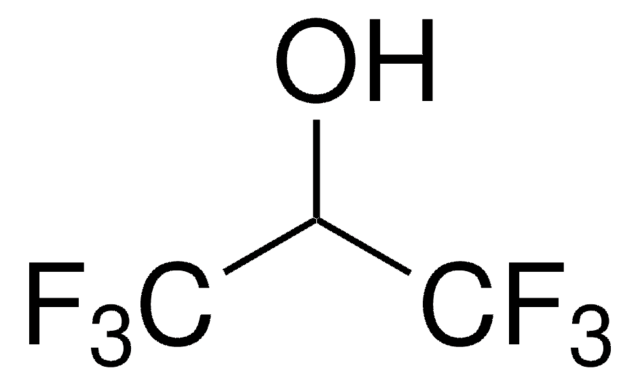All Photos(1)
About This Item
Linear Formula:
[CH3(CH2)7]2O
CAS Number:
Molecular Weight:
242.44
Beilstein:
1748226
EC Number:
MDL number:
UNSPSC Code:
12352100
PubChem Substance ID:
NACRES:
NA.22
Recommended Products
Quality Level
Assay
99%
form
liquid
refractive index
n20/D 1.433 (lit.)
bp
286-287 °C (lit.)
mp
−7.6 °C (lit.)
solubility
water: soluble 0.1 g/L at 20 °C
density
0.806 g/mL at 25 °C (lit.)
functional group
ether
SMILES string
CCCCCCCCOCCCCCCCC
InChI
1S/C16H34O/c1-3-5-7-9-11-13-15-17-16-14-12-10-8-6-4-2/h3-16H2,1-2H3
InChI key
NKJOXAZJBOMXID-UHFFFAOYSA-N
Looking for similar products? Visit Product Comparison Guide
Application
Dioctyl ether has been used in the preparation of:
- 11nm-sized monodisperse iron nanoparticles
- cobalt ferrite nanocrystals with a particle diameter of 6nm
- CoPt-polymer nanostructured composites
Storage Class Code
10 - Combustible liquids
WGK
WGK 1
Flash Point(F)
230.0 °F - closed cup
Flash Point(C)
110 °C - closed cup
Personal Protective Equipment
dust mask type N95 (US), Eyeshields, Gloves
Choose from one of the most recent versions:
Already Own This Product?
Find documentation for the products that you have recently purchased in the Document Library.
Customers Also Viewed
One-nanometer-scale size-controlled synthesis of monodisperse magnetic Iron oxide nanoparticles.
Park J, et al.
Angewandte Chemie (International Edition in English), 117(19), 2932-2937 (2005)
Synthesis and magnetic properties of CoPt-poly (methylmethacrylate) nanostructured composite material.
Fang J, et al.
Journal of Applied Physics, 91(10), 8816-8818 (2002)
Shalene Xue Lin Goh et al.
Analytica chimica acta, 1019, 74-83 (2018-04-08)
An automated bundled hollow fiber array (BHF)-liquid-phase microextraction (LPME) methodology in combination with ultra-high-performance liquid chromatography-tandem mass spectrometry (UHPLC-MS/MS) has been developed for the determination of perfluorinated compounds (PFCs) in environmental aqueous matrices. Eight PFCs were considered, including perfluoroheptanoic acid
Synthesis of highly crystalline and monodisperse cobalt ferrite nanocrystals.
Hyeon T, et al.
The Journal of Physical Chemistry B, 106(27), 6831-6833 (2002)
Hassan A Albarqi et al.
Pharmaceutics, 12(11) (2020-10-30)
Herein, we report a novel therapy for prostate cancer based on systemically delivered magnetic hyperthermia. Conventional magnetic hyperthermia is a form of thermal therapy where magnetic nanoparticles delivered to cancer sites via intratumoral administration produce heat in the presence of
Our team of scientists has experience in all areas of research including Life Science, Material Science, Chemical Synthesis, Chromatography, Analytical and many others.
Contact Technical Service












